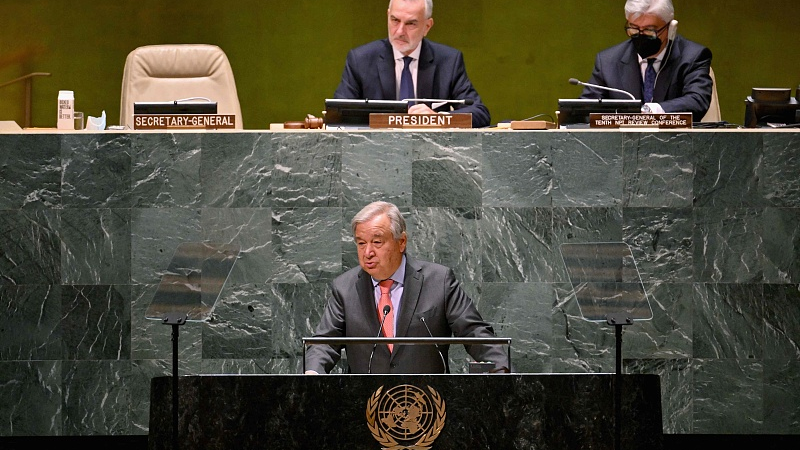
Editor's note: Hayat Bangash is a freelance columnist on international affairs with degrees in business administration and war studies.The article reflects the author's opinions and not necessarily the views of CGTN.
Exactly a year ago, it was the first time since the enforcement of the Treaty on the Non-Proliferation of Nuclear Weapons (NPT) in 1970 that weapons-grade nuclear material was agreed to be transferred to a non-nuclear weapon state. It happened under the AUKUS pact among Australia, the UK, and the U.S. With the agreement, Australia would be getting nuclear submarines in a major blow to global non-proliferation efforts.
Although the deal has been signed, the actual transfer hasn't taken place yet. That means there is still time for the world to realize the gravity of the situation and force the three countries to reverse their decision.
Despite being signatories of the NPT, the three countries are going counter to the very spirit of the treaty. As Stockholm International Peace Research Institute (SIPRI) has calculated, the amount of nuclear material required to build the submarines would be enough to make 64 to 80 nuclear weapons.
This has completely changed the security calculus of the Asia-Pacific, and the region is vehemently opposing the deal since its signing.
Several ambassadors from the Association of Southeast Asian Nations (ASEAN) countries visited the Chinese Foreign Ministry in Beijing for deliberations immediately after the deal was announced; Indonesian and Malaysian Foreign Ministers jointly rejected the agreement, and just last month at the review conference of the NPT, Indonesia said that the transfer of nuclear technology to non-nuclear weapon states will be catastrophic.
Countries of the Asia-Pacific neither want militarization nor nuclearization of the region because in the event of any nuclear incident, extra-regional forces will, at maximum, lose a fleet or two but the civilian populations of littoral states will face unimaginable consequences of the devastation.
To avoid exactly these scenarios, ASEAN countries signed the South Pacific Nuclear Free Zone Treaty in 1985. And today, China is willing to take a lead in making the Southeast Asia Nuclear Weapon Free Zone a reality.

UN Secretary-General António Guterres speaks during the 2022 Review Conference of the Parties to the Treaty on the Non-Proliferation of Nuclear Weapons at the United Nations, New York, the U.S., August 1, 2022. /CFP
UN Secretary-General António Guterres speaks during the 2022 Review Conference of the Parties to the Treaty on the Non-Proliferation of Nuclear Weapons at the United Nations, New York, the U.S., August 1, 2022. /CFP
Besides, the global economy is facing headwinds that are not showing any immediate signs of subsiding. AUKUS can trigger an arms race at such a time when East Asian states will have to redirect their resources to defense technologies to counter the nuclear submarines possibly roaming in their waters. These are the same resources they would otherwise be investing in economic revival and development.
Back in Australia, too, the amount being expended on the nuclear purchase will be much better spent on the uplift of indigenous and other disadvantaged communities that have disproportionately high levels of poverty. Hearing from the Australian Defense Minister, Richard Marles, instead, that he intends to accelerate the delivery of nuclear submarines from 18 years to 8 years is highly deplorable.
Island states of the region have been living with Australia's hegemonic mindset ever since the first colonizers set foot on the continent. Seeing its latest nuclear ambitions, they have every right to be apprehensive of the AUKUS deal. Many among them are looking at other major countries in the face of Australia's growing belligerence.
And as far as Australia's security is concerned, the nuclear submarines will actually be pushing the country into a security dilemma where its actions will cause counteractions from other regional stakeholders, forcing it to feel even more insecure.
Australia must also realize that bloc politics have no place in the Asia-Pacific. Earlier, Western intellectuals and policymakers failed to understand local conditions while exporting their brand of democracy. Now they are repeating their mistake while exporting the bloc system.
There have been several attempts to build an "Asian NATO" of sorts. The Quadrilateral Security Dialogue (Quad), failed to gain traction even before it could be upgraded to a full-fledged security collaboration among the U.S., Australia, Japan, and India. While the former two have found other ways of working together, the latter two are still not willing to sacrifice their economic interests in the service of their extra-regional partners.
Being a closed and exclusive group, AUKUS cannot be defended even under the cover of multilateralism. It is not a platform where countries can come together to solve common problems. Being inherently conflictive, it is rather a detriment to regional and global peace.
Lessons from the Cold War should guide AUKUS countries in managing differences while keeping nuclear proliferation under check. They need to open those notes again and stop making their perceived security issues a hammer and nail problem. The AUKUS deal should be revoked and nuclear weapons deployed abroad must be recalled before it is too late. Let's give peace a chance and avoid reducing treaties like the NPT to mere pieces of paper.
(If you want to contribute and have specific expertise, please contact us at opinions@cgtn.com. Follow @thouse_opinions on Twitter to discover the latest commentaries in the CGTN Opinion Section.)

